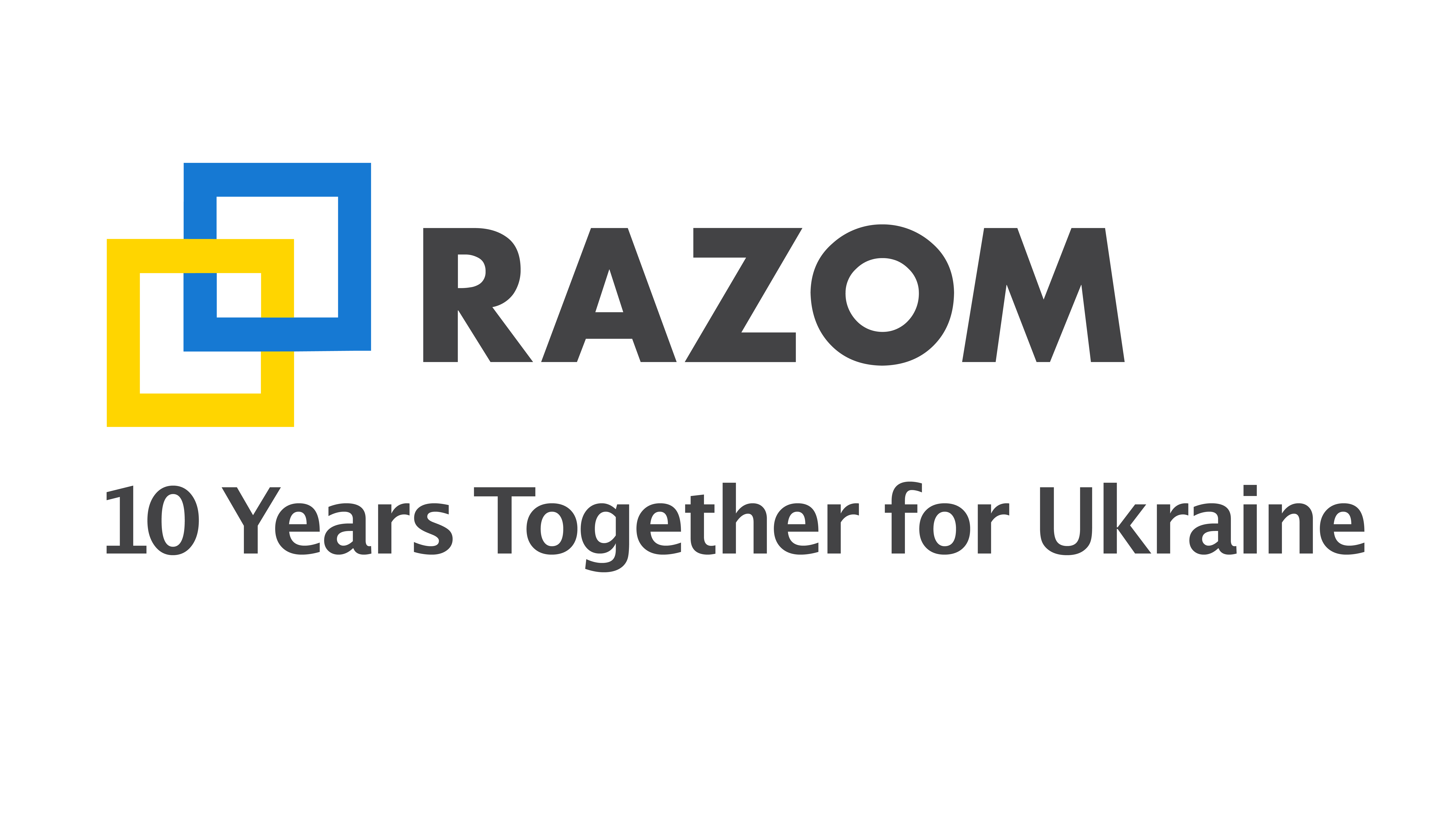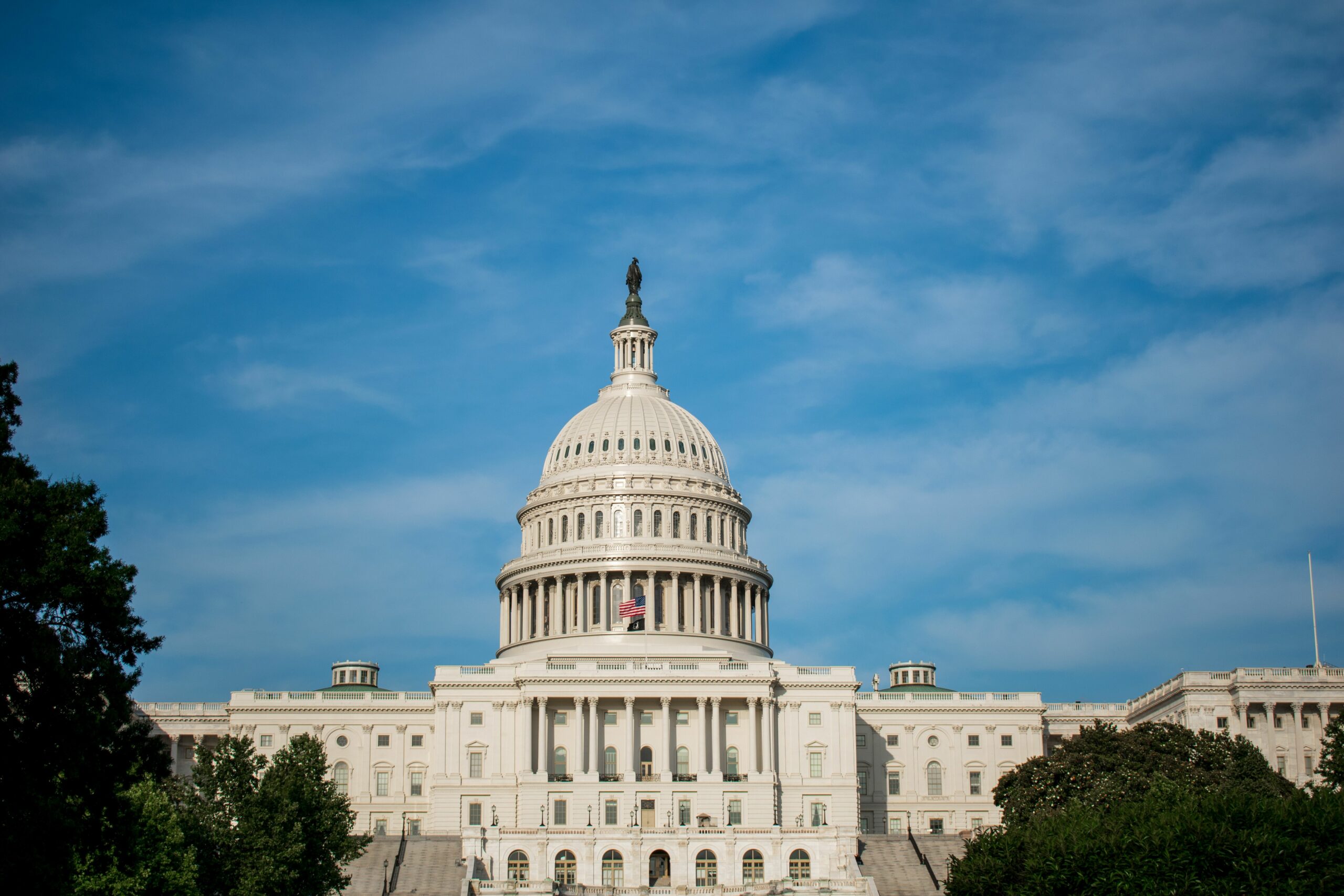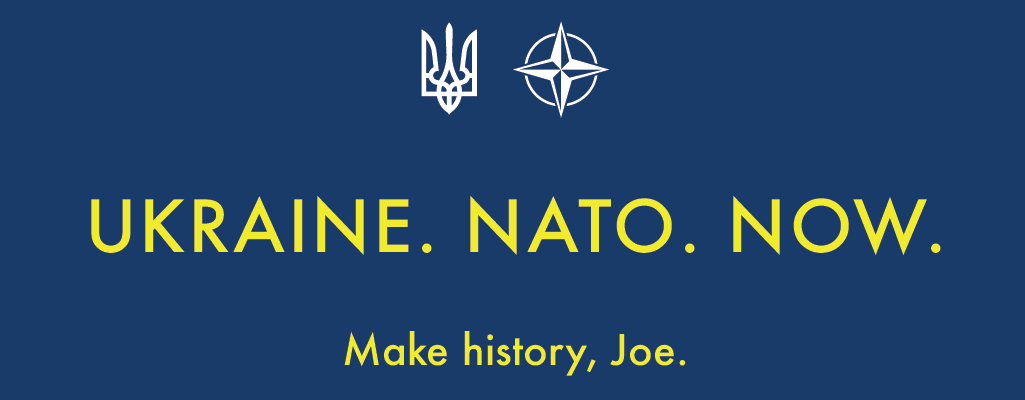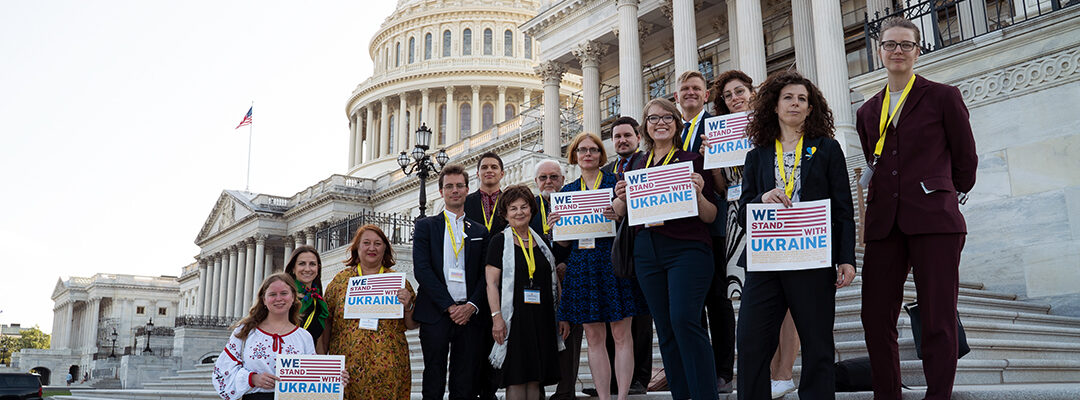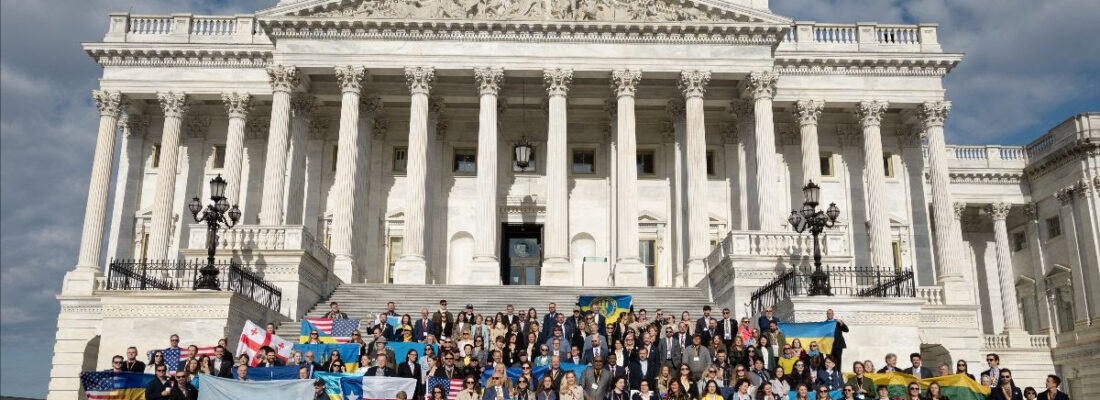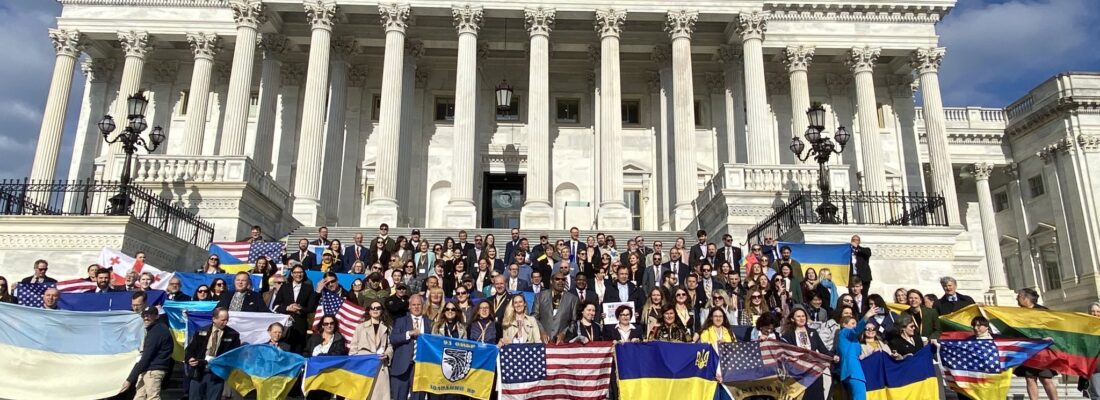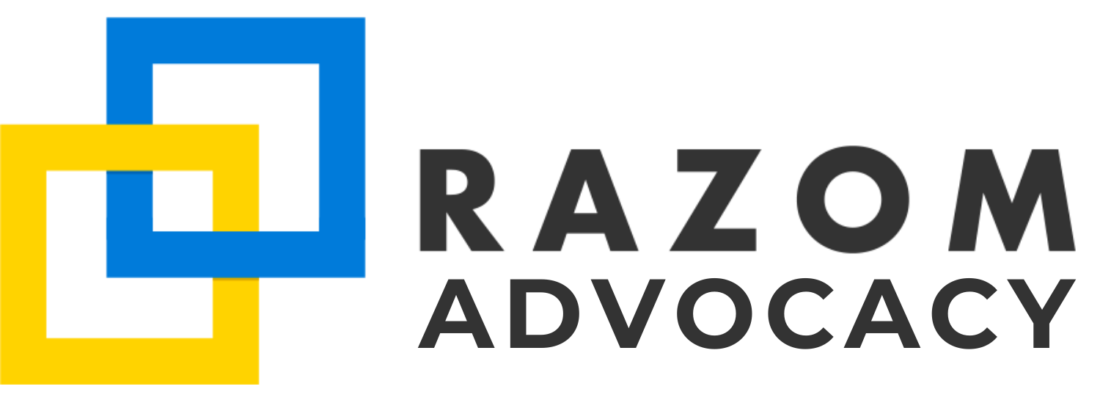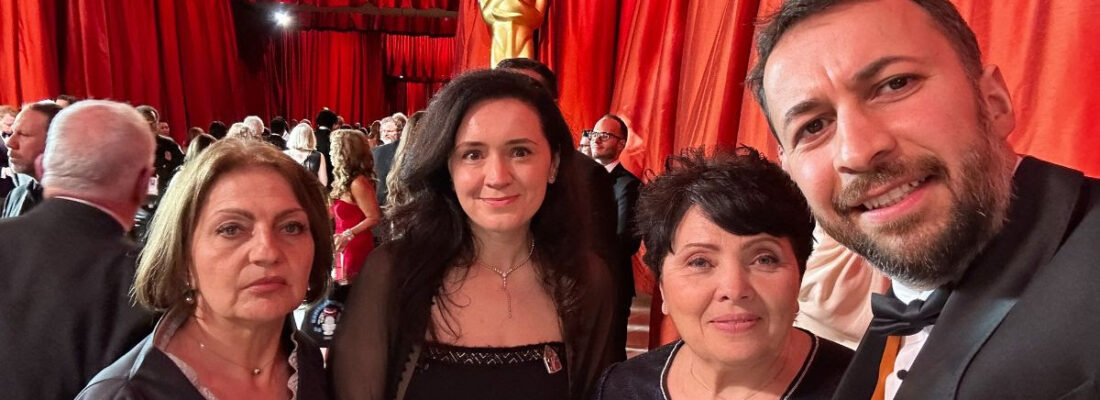Statement on NATO Summit and Proposed Amendment to Ban the Transfer of Cluster Munitions
#UkraineInNATO
On July 11-12, allies will meet in Vilnius, Lithuania for the NATO Summit and the status of Ukraine’s accession into NATO will be the top topic. We are asking the United States and our allies to support a clear roadmap of Ukraine into NATO – and invite you to join us for our #UkraineInNATO campaign.
– In 2008, NATO did not accept Ukraine and Georgia (Bucharest Summit Declaration). Since the Russian full-scale invasion, Finland has been accepted and Sweden applied for membership, resuming the conversation about including Ukraine.
– Many NATO members have expressed their willingness to accept Ukraine (Baltic states, UK, France, Poland) – the United States, which has not been clear about their support of an invitation for Ukraine, should join them. The decision about Ukrainian membership is contingent on the Biden Administration’s decision.
Read more:
- Ukraine Needs a Roadmap to NATO Membership ASAP – what exact steps NATO should take at the Summit next week.
- Why Ukraine should get an invitation to NATO – a breakdown addressing the main counterarguments to #UkraineInNATO

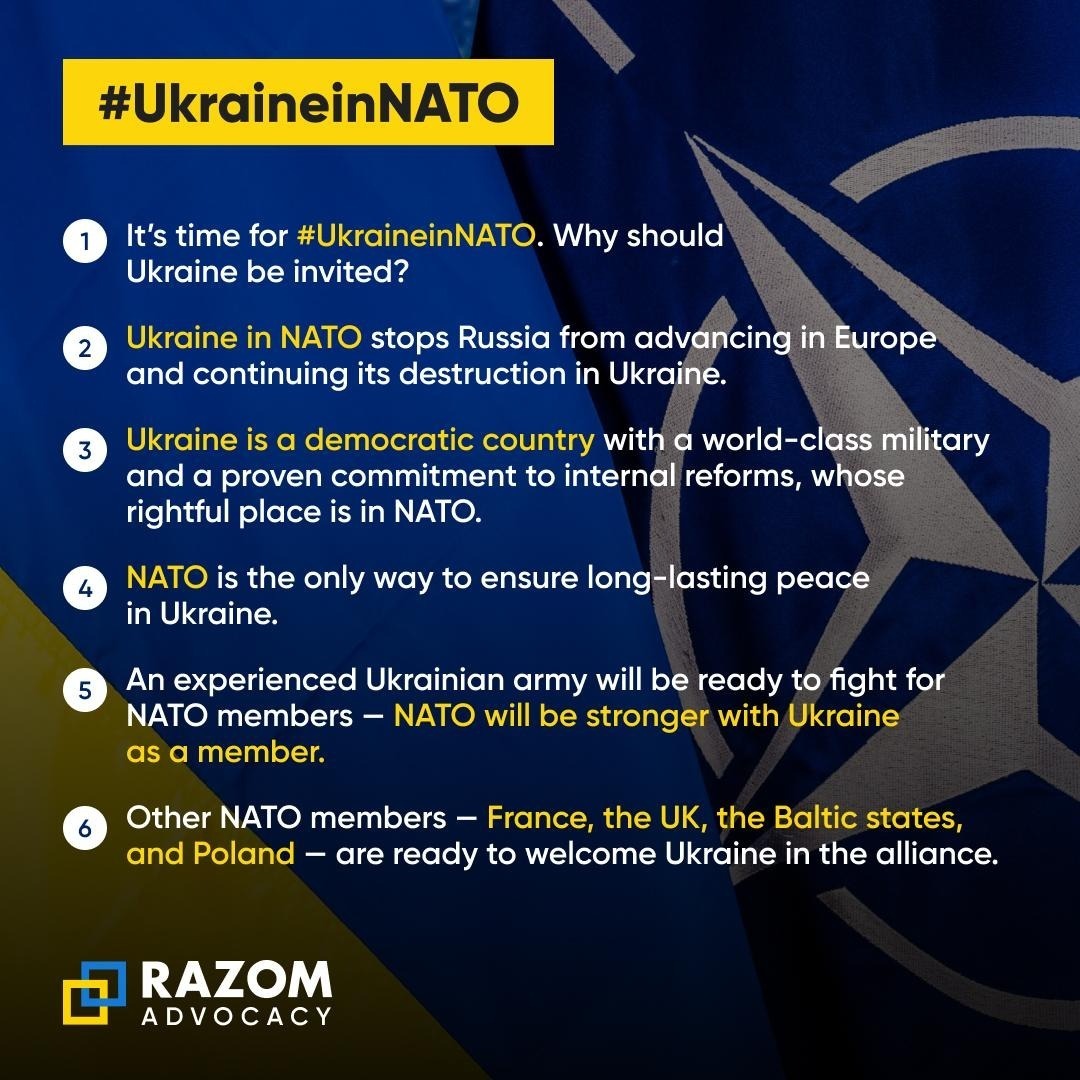
Join our campaign to broaden the support for Ukraine’s invitation into NATO by posting your message of support on social media with the hashtag #UkraineInNATO. Take your own photo – or use our graphics! Find an extended selection, free for download, here.

Need more ideas for content – or want to dig deeper into some of the reasons why NATO should admit Ukraine? Check out 7 Reasons Why Ukraine Should Receive NATO Invitation at Vilnius NATO Summit:
1. It’s cheaper to stop Russia in Ukraine than in Western Europe, and Ukraine’s eventual NATO membership is the only ironclad way to stop Russia in Ukraine.
2. Ukraine has proven that its rightful place is in NATO and is making great strides toward interoperability. It’s a democratic country making concrete efforts to curb corruption and conduct oversight with a world-class military, and an invitation to join would ensure the final steps for Ukraine meeting or exceeding NATO standards. Further reading: Just Security
3. NATO will be stronger with Ukraine as a member—Ukraine has the most experienced modern army in Europe. It has already shown it can be interoperable with NATO equipment, and NATO has much to learn from Ukraine’s 16 months of combat experience. Further reading: Newsweek, The New York Times
4. Best deterrent of future wars. Don’t repeat past mistakes—keeping Ukraine and Georgia out of NATO in 2008 allowed Russia to invade both. NATO membership is the best guarantee against future wars. Further reading: POLITICO
5. Don’t be late to the game! The consensus among NATO Allies is already building for Ukraine to join. France, the UK, the Baltic states, and Poland all are in favor of Ukrainian membership. Just like with weapons systems, consensus will only continue to build for membership for Ukraine.Further reading: Le Monde
6. NATO membership is the best way to bring stability to Ukraine and Europe. Ukraine needs weapons to win the war now, but the Alliance is what can bring lasting peace after Ukraine wins.Further reading: Washington Post
7. No more Bucharests. NATO already committed that Ukraine could join—now is the time to tell Ukraine when it can join. No one expects instant membership, but if Vilnius brings no specifics on when accession can happen, it will be Bucharest 2.0 and embolden the Russians. Further reading: Foreign Policy,Just Security
Keep up with the latest from Razom Advocacy by following us on Twitter @razomforukraine.
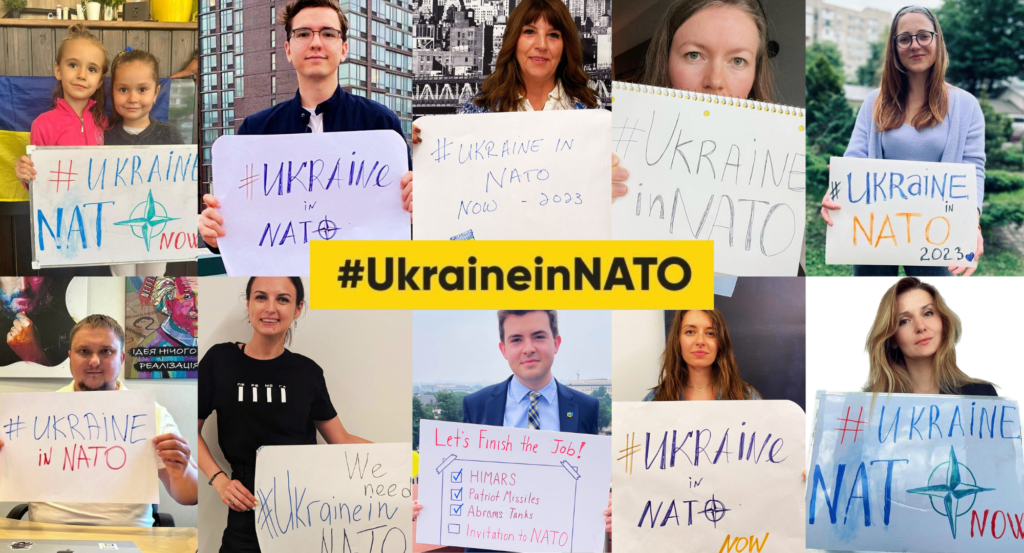
Razom Advocacy Key Messages and Target Legislation, Week of 6/22/23
As part of Razom Advocacy’s ongoing work advocating for policies that will help Ukraine achieve swift victory, we have created a weekly series of key messages/talking points and list of target legislation to help align nationwide advocacy efforts. Hover over the PDF to navigate to pages 2 & 3. Please feel free to download and distribute. Keep up with the latest on Razom’s advocacy work by following us on Twitter @razomforukraine.
Key-Messages-Week-of-6.22-1Razom Joins Statement about Congressional Ukraine Aid
2022 Impact in Review & What’s Most Critical Now
It is said, “If Russia stops fighting, the war ends. If Ukraine stops fighting, Ukraine ends.” We will not let that happen. Thank you for supporting us in so many ways towards ensuring Ukraine continues to get all the help it needs.
Dear Razom Supporter,
To be confronted over and over again with how the war has ravaged Ukraine and the people who have done what others only speak of to protect and uphold their democracy and freedom, can be devastating. But thanks to your stunning compassion and generosity, Razom has been able to reach more people than we ever imagined and solidify our network to proudly support Ukraine now and in the years ahead.
In 2022, more than 175,000 donors made it possible for us to deploy over $62 million towards our mission to save lives in Ukraine and meet the dynamic and critical needs of Ukrainians as they continue to resist russian forces.
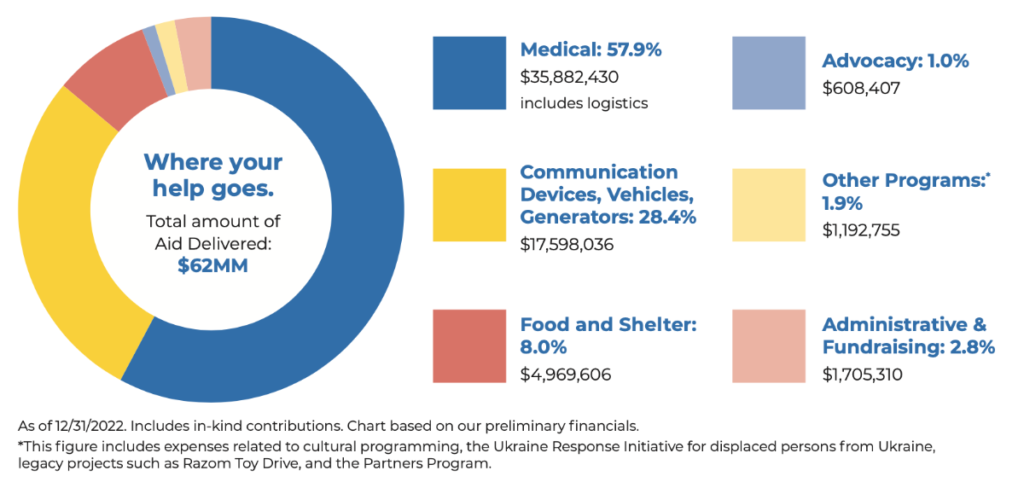
The passionate outpouring of support from people like you created a tremendous opportunity for our programs. In order to achieve the greatest impact, we have now focused our efforts on the following five critical areas of support:

In each of these five categories, together with Razom staff, volunteers and our partners, we’ve been able to have tremendous impact on the lives of Ukrainians from all walks of life.
When the world needs to hear the truth about russia’s actions and aggression, Razom Advocacy is there. In 2022 our team organized more than 525 meetings with congressional offices to ask for critical support for Ukraine, co-founded the American Coalition for Ukraine (ACU) uniting 57 diverse organizations and constituents from all 50 states, and held an inaugural Ukraine Action Summit in Washington, D.C. a fly-in event with over 250 constituents from all over the country participating.
In the first quarter of 2023, Razom Advocacy co-organized a second Ukraine Action Summit that expanded to over 300 advocates from 34 states, and brought together 62 organizations representing the ACU. It was three days in Washington D.C. full of congressional meetings, advocacy training, panel discussions, and networking, and it was focused on a singular message – Ukraine must win. All told, the advocates met with one-third of the offices in Congress. You can read more about it on our website.
Beyond the Summit, our team has testified before Congress, led hundreds of government briefings and meetings, drafted dozens of policy briefs, proposed legislation, and amplified countless Ukrainian voices to protect bipartisan support for Ukraine and advance pro-Ukraine policy that is aligned to U.S. national interests. Don’t forget to join our advocates network to get the latest news from Razom Advocacy.

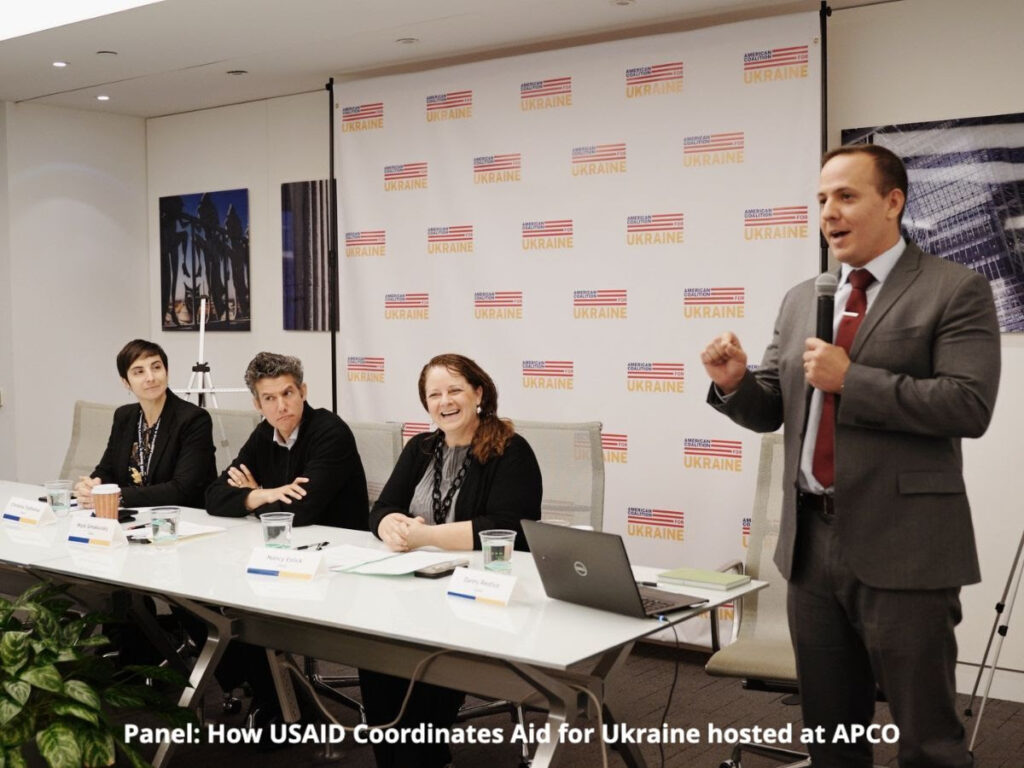
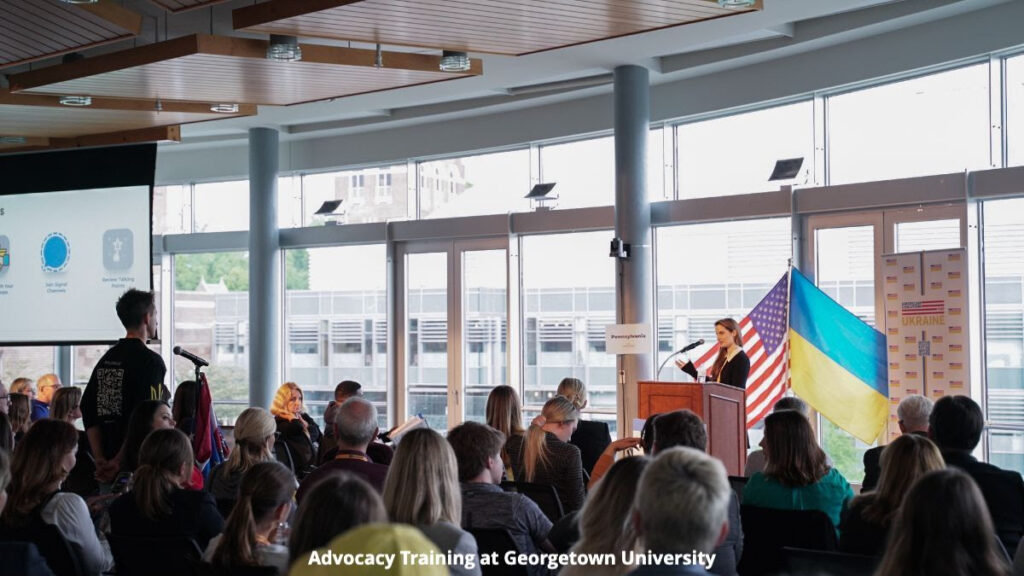
When a defender in a remote field needs a tourniquet, Razom Heroes is there. In 2022, the team deployed in-house order tracking software and a Ukraine-wide delivery system where Razom drivers take aid directly to the hot zones, delivered over 500 tons of life-saving supplies (including purchasing nearly 400,000 tourniquets), and packed and delivered almost 90,000 Individual First Aid Kits and over 2,000 tactical medical backpacks. We’ve also delivered over 2,000 quadcopters for safe passage and evacuation, and sourced and serviced 69 cars for frontline medics to use as first line evacuation. We have also supplied over 14,000 radios and over 2,000 tablets to keep Ukrainians connected on the front lines. In 2023, as the war continues, so does the procurement and delivery of this type of life saving aid.
Between March 17-May 7 of 2023, Razom Health successfully co-organized and coordinated four medical mission trips to Ukraine. You can read about each specific group of doctors and nurses that traveled here, and click above to watch a deep dive into what it takes to bring a trip like this to life and its impact.
This specific team of American-Canadian volunteers, 8 doctors, and 4 nurses arrived in Ivano-Frankivsk in March to perform 35 complex surgeries for the Ukrainian military and civilians all while providing training for Ukrainian doctors to ensure the impact of their work gets multiplied long after they leave. Given the demanding hours and complexity of the surgeries, Razom’s team organized the many logistical elements essential to the smooth running of these missions, including covering travel, accommodations, daily logistics, and purchasing necessary equipment.
There’s some great reporting that’s been done covering these trips including interviews from the doctors who traveled to Ukraine and the Ukrainian lives that have been changed by their work.
When war-torn hospitals need ultrasounds and wound vacs, Razom Health is there. In 2022, we supplied 419 medical facilities in Ukraine with aid like ultrasounds, wound vacs, electrosurgery machines, orthopedic fixators and more, delivered 23 hospital-grade generators so doctors could continue delivering critical care even when the lights were out, and launched 2 mental health centers in Ukraine with over 800 individuals served (65% using mental health services for the first time).
When families are displaced, hungry, sick, or in danger, Razom Relief is there. In 2022, the team awarded $5M in grants to a network of 123 volunteer organizations in Ukraine that help their local communities. Collectively, these organizations distributed 221,458 food packages to people in need, evacuated 9,640 people, renovated 91 buildings including 11 shelters, and supported 18 shelters that provided 2,375 sleeping places. Over the winter the team procured and delivered 90 generators and 50 charging stations to resilience points, shelters, and humanitarian hubs across Ukraine.
When the world needs to hear voices from Ukraine, Razom Culture and Connections is there. In 2022, our team organized the concert to commemorate the 100th anniversary of Shchedryk’s (Carol of the Bells) premiere at Carnegie Hall with Ukrainian and Ukrainian-American artists and celebrity guests, funded filmmakers from Ukraine to attend international film festivals (including Sundance and the Academy Awards) so people could hear directly from creators and make connections, and supported multiple cultural exchanges, book clubs, and concerts.
We couldn’t have done all this without your support and generosity! With your donations we can scale and continue to support Ukraine now and in the years ahead.
In the meantime, we hope to run into you at any number of these incredible events in New York and across the country that are really worth your time!

This weekend come see “Undesirable Elements: Ukraine” a collaboration of Ping Chong and Company and Yara Arts Group at the Ukrainian Museum on E 6th St in NYC. The production explores the experiences of Ukrainian-American New Yorkers and recent arrivals from Ukraine.
In director Ping Chong’s “Undesirable Elements” series, real people tell about their own lives. Since 1992, over 65 “Undesirable Elements” productions have been made in communities across the country and around the world.
You can get your tickets here & at the door.

Razom is honored to host an event at the Ukrainian Institute of America in NYC this weekend that’ll feature Ukrainian voices at this year’s Pen World Voices Festival. This evening will be mostly in Ukrainian and registration is required.

Come catch a performance from Trevor Noah: Off the Record Tour and fundraise for Ukraine! Led by a diverse group of Benefit Committee Members, it’s sure to be a really special evening.
Grab your tickets by May 15th here.

Just look out for the yellow couch and you’ll find us!
This year at Razom Lounge at the festival, we’ll be hosting special guests, showcasing the work we’ve done over the last year, raising money for bigger projects to help Ukraine, and revealing some fun surprises throughout the day.
The Razom Ukrainian Response Initiative will also be part of the Razom Lounge, giving recently arrived displaced Ukrainians an opportunity to discover the Ukrainian Festival for themselves, meet the community here to support them, and share their stories.
P.S. Interested in volunteering at the Razom Lounge? Send us a message.

Razom is a Presenting Partner with the Human Rights Watch Film Festival, which will feature a Ukrainian documentary WHEN SPRING CAME TO BUCHA. It poignantly captures how a small community continues with life amid trauma and loss while war rages on close by.
Join audiences for its US premiere at the #HRWFFNY taking place on 6/6 at Film at Lincoln Center and the second screening on 6/7 at the IFC Center. A live Q&A with filmmakers and special guests will follow the screenings.
You can also stream the film across the US as part of the digital festival between June 5-11.
Find out more information and book tickets here.

Ukrainian singer/songwriter and winner of the 2016 Eurovision Song Contest, Jamala is going on her first major USA and Canada tour!
The show includes music from different periods that will be performed through a special electronic interpretation. The tour name, “Like A Bird,” is a reference to the track of the same name from the “All Or Nothing” (2013) album.
Get your tickets here and join Razom at the New York City show on June 2 at Racket NYC. She’ll be in Philadelphia, Chicago, Toronto, Montreal, Vancouver, Seattle, San Francisco, Los Angeles, Minneapolis, and Orlando too!
Razom for Ukraine and Partners’ 2nd Annual Ukraine Action Summit Brings Together 300+ Advocates in Washington D.C.
WASHINGTON, D.C — This April, Razom for Ukraine, along with our partners in the American Coalition for Ukraine, co-organized the 2nd Ukraine Action Summit in Washington DC. This year, we expanded on all fronts – more participants, more partner organizations, and more programming. Over 300 participants from 34 states, representing 62 organizations, joined us in Washington D.C. for three days of Congressional meetings, advocacy training, panel discussions, and networking.

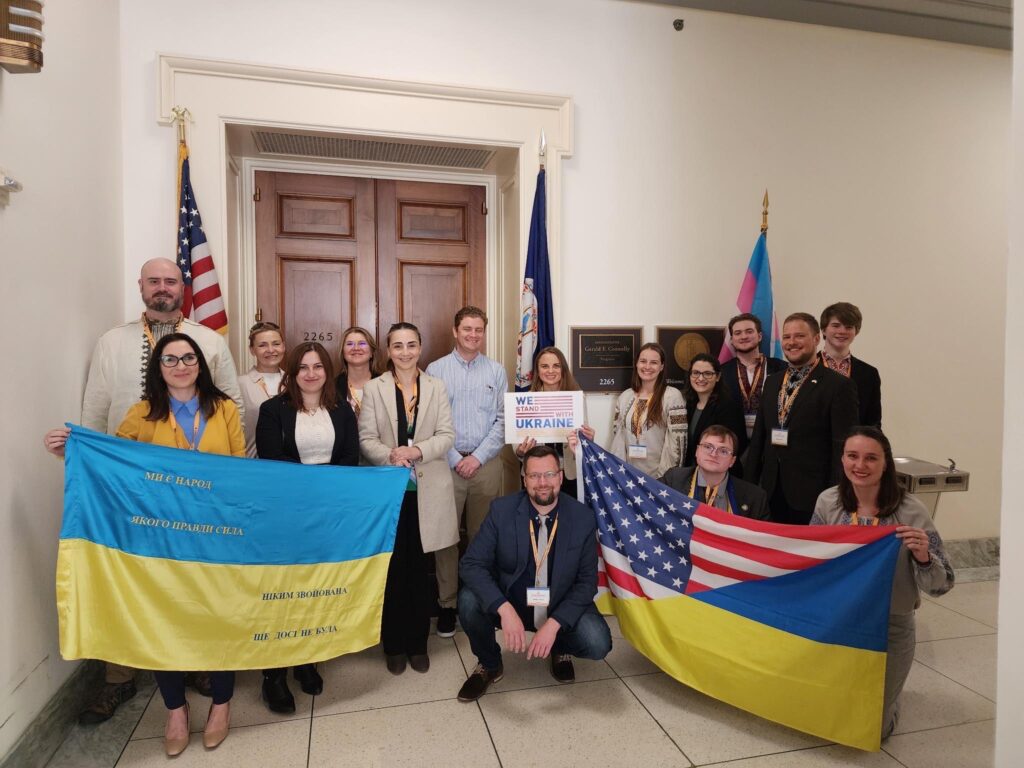
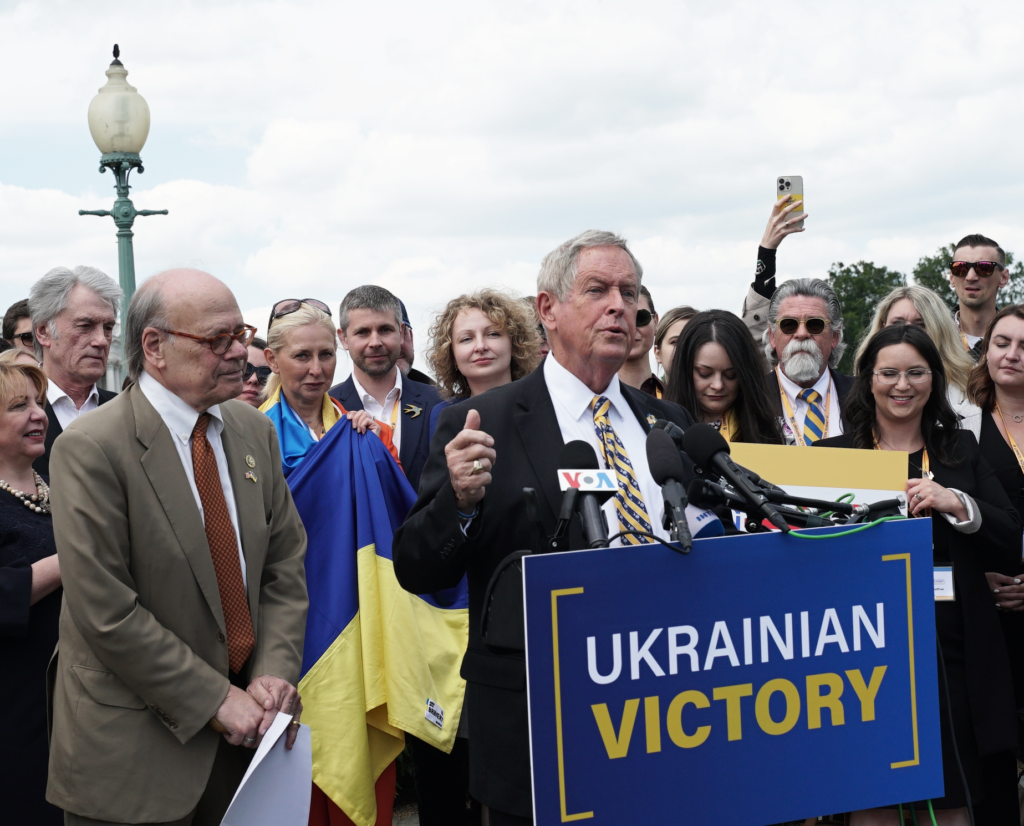
Our Summit began with a kickoff and advocacy training session at Georgetown University, where participants were given a primer on the key legislative issues around Ukraine, how to talk to lawmakers and staffers and met with their state delegations. For the next two days of the Summit, participants joined over 150 meetings with Congressional staffers, offices, and representatives from states across the country. All told, they met with 1/3rd of the offices in Congress.

During the meetings, participants discussed the measures Congress can take to help Ukraine, including designating the Wagner Group a foreign terrorist organization, declaring Ukraine’s invasion a genocide, providing consistent military aid, condemning Russia’s forced transfer of Ukrainian children, and more. We want to thank all the offices that welcomed our participants, and have supported Ukraine – victory will require us all working together.
Nearby, participants also attended panel sessions, held in downtown D.C, where they heard from experts on topics such as aid to Ukraine, the latest analysis from the frontlines, decolonizing Western academia, stopping genocide and child deportations, media and advocacy, and more. Experts presented candid insights and actionable tips for participants to maximize their advocacy work and educate their communities about Ukraine – thank you to all our panelists for joining us!

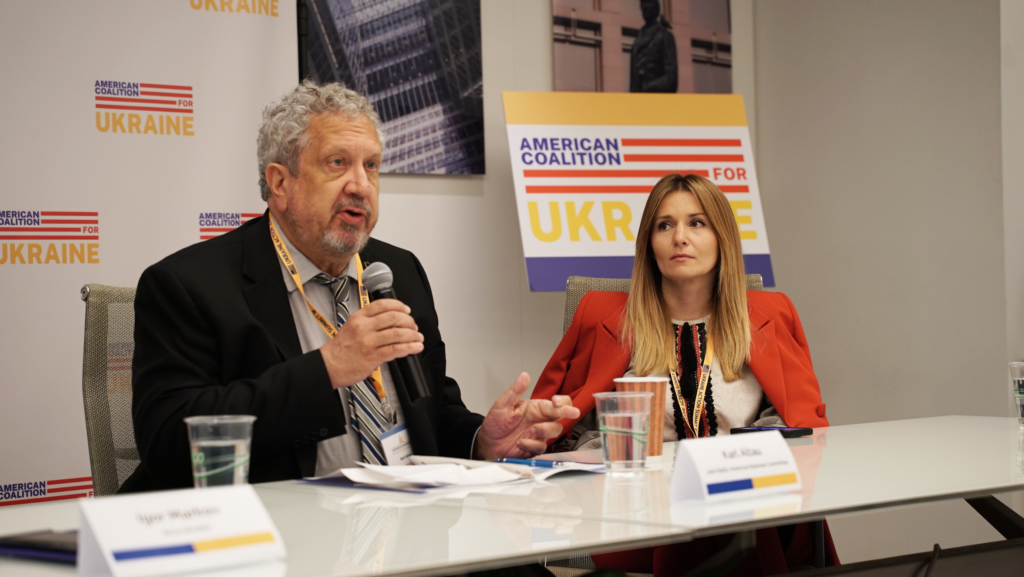
On Tuesday, participants joined a press conference on Capitol Grounds featuring Representatives Wilson, Cohen and Kaptur, alongside Ukrainian President Viktor Yushchenko. At the conference, the representatives announced the bipartisan Ukrainian Victory Resolution. The resolution affirms that it is the US policy to support Ukraine’s victory against the Russian invasion and holds that Ukraine must secure its victory by integration into NATO. It also declares that the United States must work with its allies and partners to ensure that Russian leaders are held accountable for their acts, while Ukraine receives reparations, reconstruction, and justice.

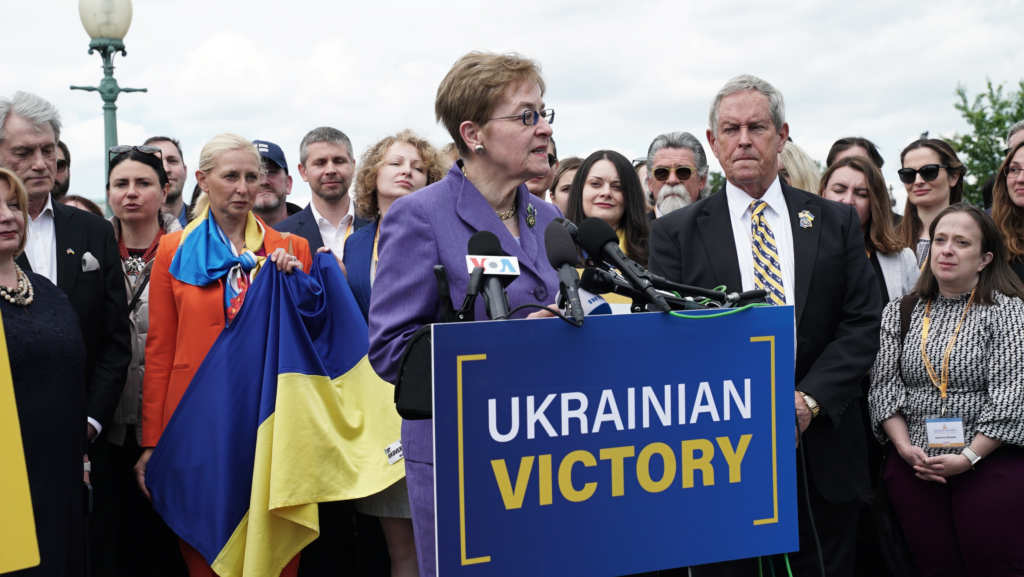
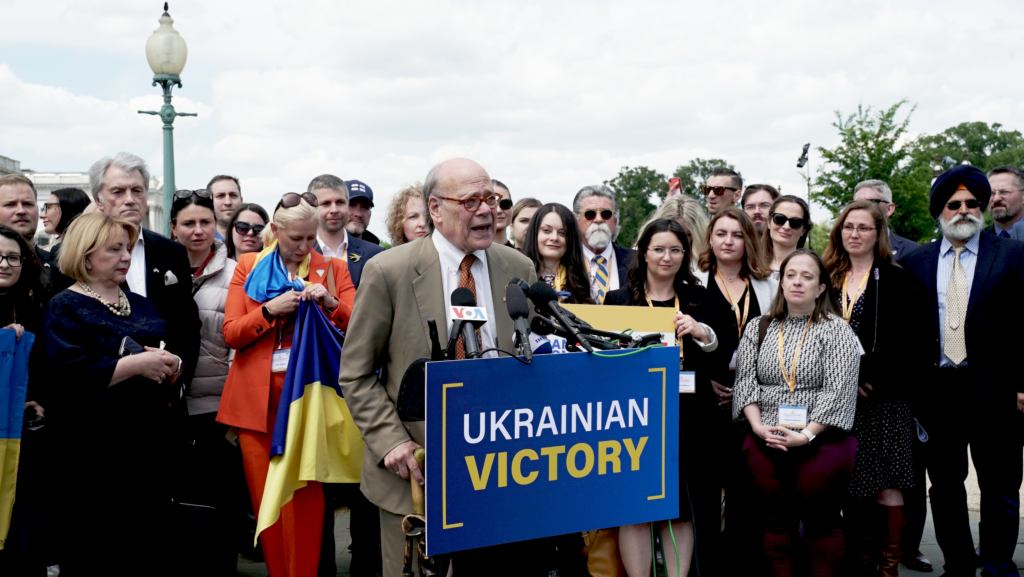
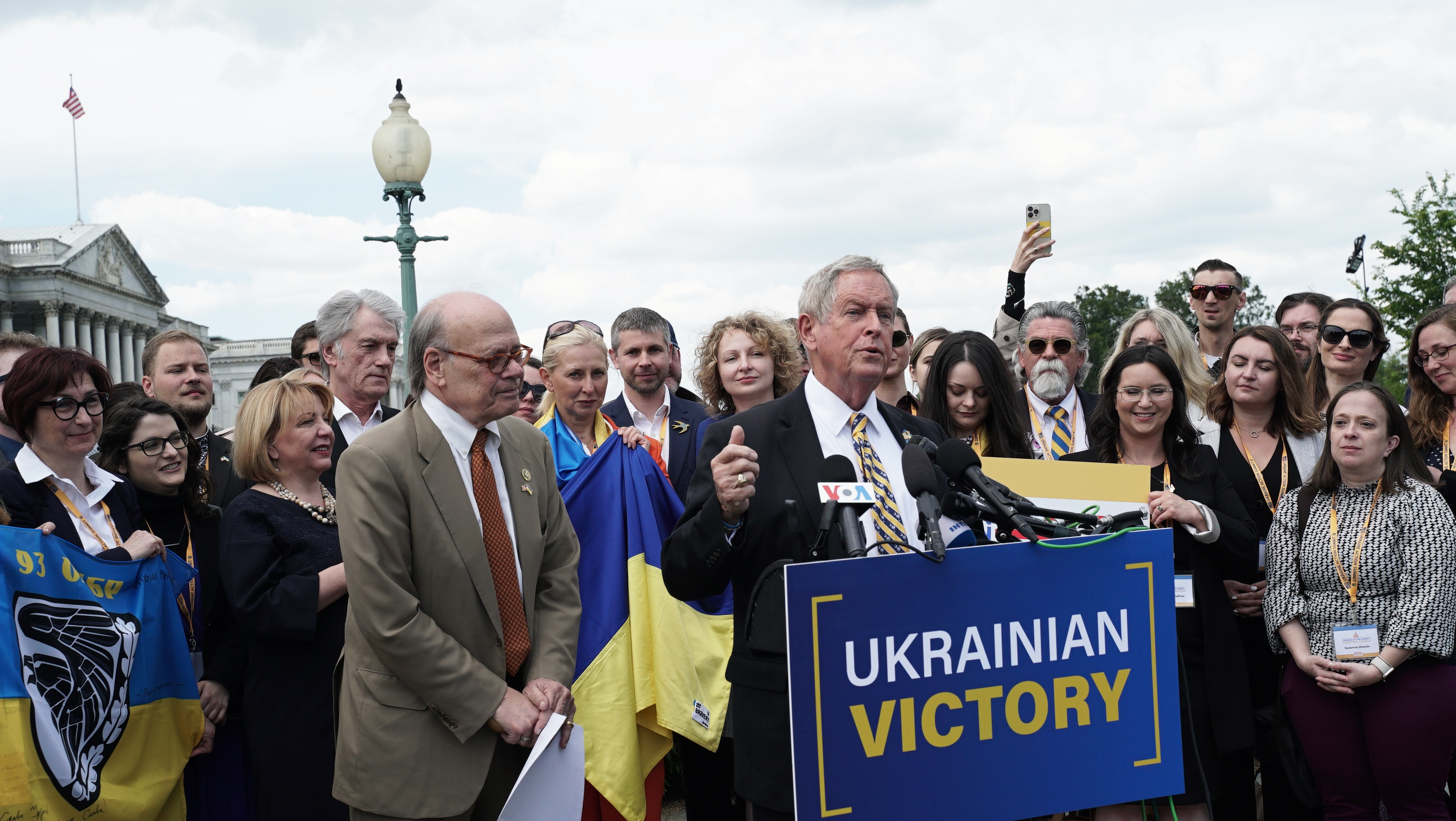
Thank you to these representatives and cosponsors of this important resolution, and the representatives who introduced it in the Senate: Senators Blumenthal, Whitehouse, and Graham. It is vital for our international partners that the United States have a clearly articulated strategy for supporting Ukraine – and this resolution lays out a vision for a secure, just peace for Ukraine.

The work of organizing the Summit was headed up by Razom Advocacy – a branch of Razom for Ukraine committed to advancing nonpartisan research and policy and to nurturing community engagement across the United States and Ukraine – in collaboration with the American Coalition for Ukraine. To learn more about the Ukraine Action Summit and the American Coalition for Ukraine, visit AmericanCoalitionForUkraine.org, & check out the hashtags #UkraineActionSummit on social media.

Being able to bring together so many advocates from around the country to fight for peace, justice, and prosperity in Ukraine, for the second time in less than a year, has been stupendous. Showing unity and enthusiasm is crucial for sustaining strong support for Ukraine by our representatives. We look forward to continuing this important work together. To be the first to know about the dates for the next Summit, follow the American Coalition for Ukraine on Facebook.
Joint Statement on Recent Comments by Governor DeSantis
How we’re advocating, and more, for Ukrainian victory!
Our regularly scheduled updates on major programs below, but also a spotlight on Advocacy and the amazing cultural events happening this season.
Dear Razom community,
In each newsletter, we try to share with you how your support impacts our programs for first responders and defenders on the frontline, the strained healthcare system, and the work of NGOs across Ukraine. You’ll still see those updates below, but a year into the war, we see how it has become even more important for Razom to advocate for Ukraine on multiple fronts, whether at the Oscars, Congress, or your inbox.
Razom sponsored the travel and stay in LA over the past week of four Ukrainian team members from the Danish-Ukrainian co-production A House Made of Splinters, a documentary film nominated for this year’s Oscars. Shot in 2019-2020, the film follows the life inside a halfway home for children whose parents aren’t capable of taking care of them near the frontlines in Lysychansk, Ukraine (a town currently under russian occupation, after which the shelter was damaged by a missile strike). As some parents succumb to the consequences of life in a region devastated by yearslong war, you get a rare and deeply touching glimpse at their children, who become larger than life heroes in a fight for their own happiness, childhood, and right to feel a family’s love. It’s the children’s hope and wisdom that captured us, so when we had the opportunity to support Azad Safarov (Assistant Director and Line Producer), Olena Rozavodovska (Project Coordinator and Co-Founder along with Azad of Voices of Children), and the incredible caretakers in the film Marharyta Mykolaivna and Olga Viktorivna on their working trip to the US, we signed on.
Not only did they represent Ukraine at the Oscars, but they spent every day giving interviews to national and international media raising awareness about russia’s crimes against Ukrainian children and their families during this war — those killed, abducted, and countless of their families, homes, and schools destroyed. You can learn more about the planned policy of deportation of Ukrainian children, a direct violation of the Genocide Convention, here, via a Twitter Space hosted by Razom Advocacy. You can watch A House Made of Splinters on Apple TV+ or Amazon Prime, you will not regret it.

Our team at Razom Advocacy continues its hard work advocating for Ukraine by holding high level meetings with government officials, conducting diverse research projects to support policy advancement, and doing outreach on social and traditional media to elevate Ukrainian experts and voices. So far this year, we’ve had over 20 face to face meetings across the legislative and executive branches, and we’re just getting started.
The Advocacy team invites you to join all of us at Razom at the Ukraine Action Summit on April 23-25, 2023 to advocate in person in Washington D.C. It’s the American Coalition for Ukraine’s 2nd Ukraine Action Summit consisting of advocacy workshops and trainings alongside Congressional meetings on Capitol Hill, where you’ll speak directly to lawmakers about Ukraine. Learn more and register here. During last year’s summit, participants joined 150 meetings with representatives from 30 states and 110 Congressional districts – help us surpass that record this year!
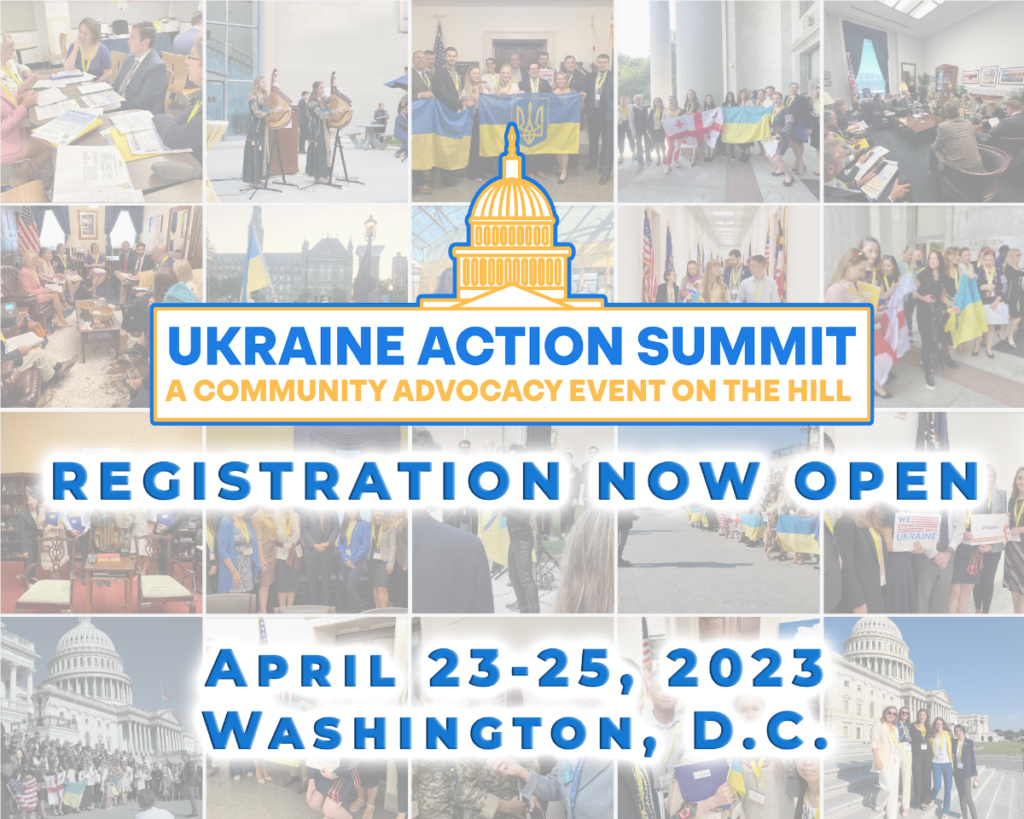
Here’s a bit more about what Advocacy is doing to bring Ukraine closer to victory – and how you can help.
- Contact your representative! Constituent voices are an integral part of how lawmakers decide what bills to support – and Ukraine needs you. Our current campaign is pushing for the passage of the HARM Act: learn more. Plus, check out the Renew Democracy Initiative’s Hold russia Accountable campaign.
- Follow us on Twitter and join us weekly on Fridays at 1pm EST for Twitter Spaces about Ukraine. This week’s topic: nine years since russia’s annexation of Crimea.
- You can always learn more about the situation in Ukraine through our research reports on our website. Currently you’ll find info on ecocide, food security, & the Wagner Group during this war, and can read our latest op-ed: “Don’t Believe the Hype – Bipartisan Support for Ukraine Remains Strong in Congress”

Everyday Razom is grateful for the incredible community of donors that have come together consistently (and creatively!) to fundraise in support of Ukraine. We are proud to work with teams across the world to bring a diversity of programs and projects for you to connect with that have a direct impact on the lives of Ukrainians fighting a war on multiple fronts, the outcome of which will shape the century to come for all of us.
So when a generous donor from the states requested that their gift be used specifically to impact Ukrainian Defenders, our team put that money towards procuring and delivering 41 Motorola radios, 1 mobile shower/laundry, and 5 pickup trucks into the hands of battalions near the front line. The specialized mobile baths are a recent innovation manufactured right in Ukraine, supporting the local economy, while the cars were prepped by our team (including painting the initials of the donor’s father on every pickup) for medical evacuations. Check out the photos below of the soldiers taking the time to offer proper thanks by sending a gift of their own from Ukraine to the US.

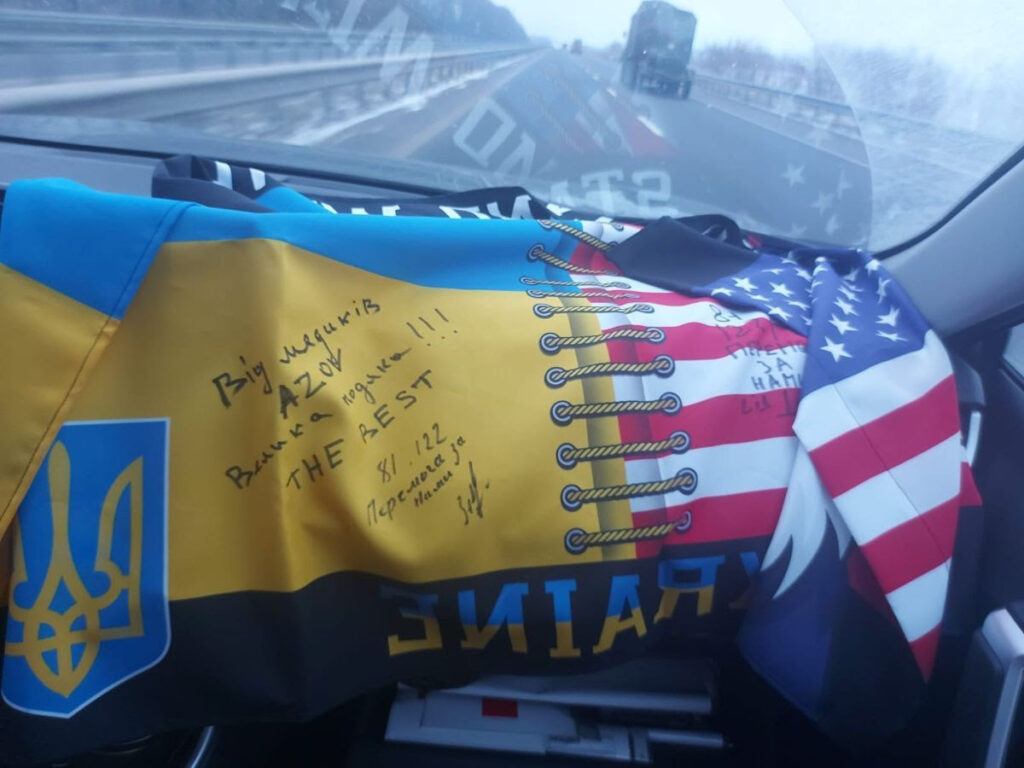
Our team at Razom Health continues to be busy connecting the resources of our generous partners and in-kind donors to healthcare institutions with the greatest need across Ukraine, as well as gearing up for its next medical missions. Here’s the latest:
- Some folks from Hearthstone Care based out of the Catskills in New York collected and helped transport a 53 foot-long container of medical beds and other durable medical equipment that we’ll ship and distribute to medical facilities across Ukraine.
- As missile strikes continue to terrorize Ukrainian civilians across the country (just last week 81 were launched into every region of Ukraine), providing vital medications and medical supplies continues to be a need that Razom is able to address. Last week, another in-kind donation from our partners CMMB got distributed in Ukraine.
- Photos of medical professionals wearing their brand new FIGS keep coming our way, this time from Ivano-Frankivsk, Sumy, and Odesa. FIGS deserves another special shoutout as they’ve been, and are committed to continuing, taking part in our medical missions like the upcoming Leap Global Missions, Face the Future, Face to Face, and Neurosurgeon medical trips throughout March, April, and May by providing the necessary medical scrubs for all of the American and Ukrainian surgeons and nurses taking part.
- Partnering with four different US Medical Doctors Associations, Razom has organized four medical missions (so far!) for this spring as part of our Co-Pilot Project that aims to raise the level of medical and surgical care in Ukraine through trips by American physicians to exchange their expertise, and the provision of critical equipment aimed at building programs. You can learn about our most recent medical mission trip with AAFPRS (American Academy of Facial Plastic and Reconstructive Surgery) in the “Face to Face” that offers Ukrainians, military and civilians alike, extremely complex reconstructive surgeries and a chance to have a normal life. Consider donating to support more of this work with Razom here.


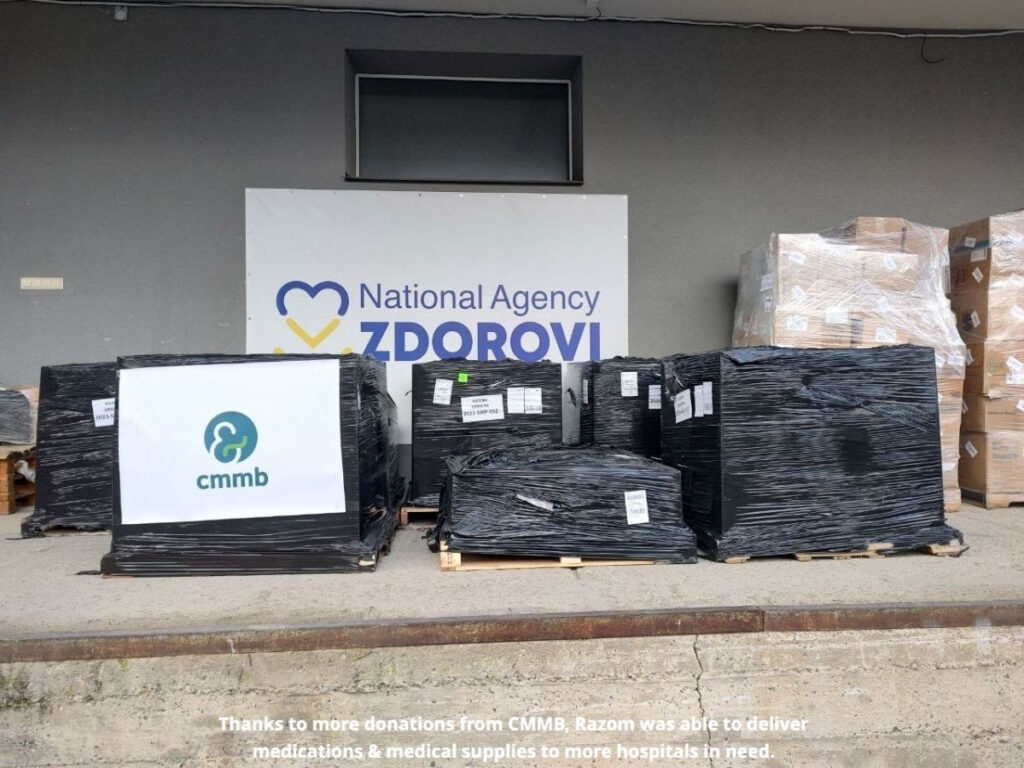
Our team at Razom Relief continues to find, vet, and accelerate the impact of Ukrainian NGOs and grassroots aid initiatives across much of Ukraine whose ability to quickly step in to provide critical humanitarian support is unparalleled. Below a round-up of some recent initiatives:
- Kyiv-based volunteer group Yangoly UA organized a movement called “Brave to Rebuild” and is leveraging support from Razom, Epicenter K, World Central Kitchen, and other local Ukrainian businesses & organizations to restore several damaged buildings at once. Led by a group of students in Kyiv after the de-occupation of nearby suburbs, they’ve organized over 1,500 volunteers (taking time between classes or on the weekends) in the past year to help clear debris and patch up buildings impacted by russia’s terrorist missile campaign. Sometimes they’ll collaborate with BUR (Building Ukraine Together), a Razom Partner since 2016 that runs youth camps that rebuild and repair homes for displaced Ukrainians.
- In Summer 2022, VAAD Ukraine (the Association of Jewish Organizations and Communities of Ukraine), started a psychological recovery program for women and children called “Renewal During the War.” Razom supported the 31st and 32nd camps (run in 2023) of the program, where in each, around 40 women and children got together for three weeks in safe corner of Ukraine to participate in individual and group therapy, art therapy and various creative classes.
- A volunteer group called “Oops, Life In My City” successfully repaired and equipped a bomb shelter in a school in the city of Chernihiv thanks to Razom’s support. Border towns and cities in Ukraine are subjected to russian shelling almost daily, forcing those who refuse to leave behind their homes, to hide in bomb shelters. There are many such groups in Ukraine doing this work that Razom has been supporting for nearly a year now.

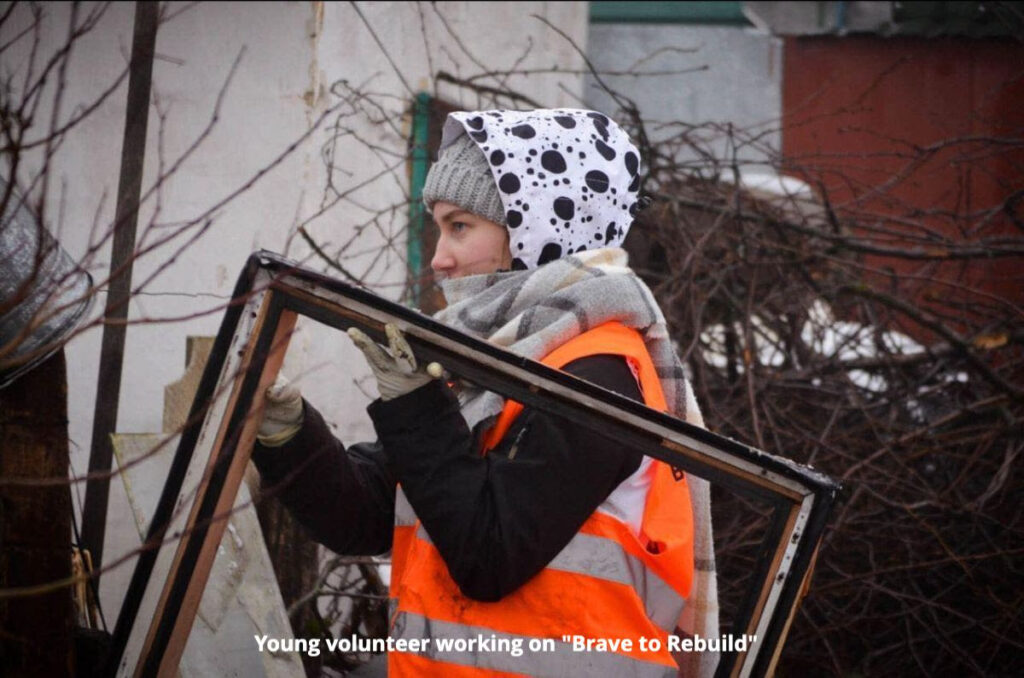


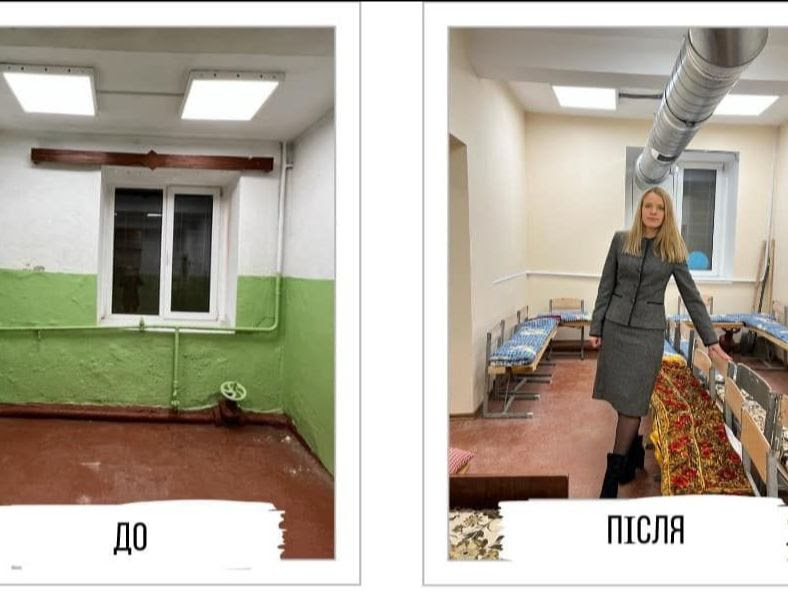
There are lots of excellent events happening across the US right now that bring special opportunities to connect with Ukrainian artists and culture and you can find our shortlist of them on our website. Below is a round up of a few we want to bring to your attention.

You do not want to miss this. Serhiy Zhadan, one of Ukraine’s most celebrated writers and a longstanding partner of Razom, is in the US on a big tour (he’s likely doing poetry readings in a city near you this week) is taking part in a special week of performances at La MaMa in NYC with Yara Arts Group. Get your tickets here.

Attention film lovers! Once you’re done streaming A House Made of Splinters, you’ve got at least 9 other films you can watch through Ukrainian eyes thanks to the Cleveland International Film Festival later this month. Here’s a list of the 8 features, 10 shorts, and 3 Razom supported projects we recommend: https://www.instagram.com/p/CpllL41vLmr/

You’ll definitely see us at the “Art in Time of War: Celebrating the Resilience of Ukrainian Culture” event at Low Library on March 27th. Hosted by The Harriman Institute & The President’s Office of Columbia University, you’ll get an opening address from Razom’s CEO Dora Chomiak, poetry, film, music, followed by a panel discussion and reception. Secure your tickets here.

We are so excited to be one of the sponsors of the “i am u are” Ukrainian Creators Fair in NYC March 24-26th! Come meet and support the modern creative industry of Ukraine — its culture, technology, art & design have always been here and are here to stay. Learn more and secure your tickets ASAP here.
As always, thank you for standing with Ukraine, for spreading the word about the amazing work featured all throughout this newsletter, and for joining us.
#stayrazom
Environmental Damage and Ecocide of Ukraine
Introduction

Since 2014, the ecological situation at the eastern border of Ukraine has shown a sign of significant deterioration as a result of Russian military aggression. The harmful effects on the environment have been amplified by the full-scale invasion, as Russia has utilized high-precision weapons to attack critical infrastructure such as hydroelectric power plants, water infrastructure, oil refineries, and chemical and pharmaceutical warehouses. This has resulted in the contamination of soil, air, surface and underground water. These have a direct impact on Ukrainian livelihoods and biodiversity leading to a major environmental catastrophe. Despite the severity of the situation, the effects on the environment have not received enough public attention, rendering it “an invisible front.” Last year, environmental NGOs and Ukraine’s Ministry of Environmental Protection and Natural Resources took steps to document the damage through initiatives such as EcoZagroza. According to EcoZagroza, there have been 2245 verified reports of military actions with a direct impact on the environment since the beginning of the full-scale invasion. As this report aims to show, the war has many far-reaching consequences on the environment, with Russia actively engaging in the weaponization of critical and civilian infrastructure and the environment. Accurately assessing the environmental damage is necessary for achieving justice and carries important implications for the post-war restoration and compensation plans.
Environmental Damage
Water pollution

Eastern Ukraine is a heavily industrialized region with an abundance of mines, factories, and refineries. The infrastructure has been subjected to frequent attacks by Russian missile strikes leading to the release of toxic substances into closed bodies of water and the ground. Since the beginning of Russian shelling, most mines in the region have been closed. The lack of supervision, and, thus, the lack of pumping mechanisms, risk the flooding of mines which leads to acid mine drainage or the outflow of toxic, contaminated water, usually with sulfur-bearing materials and metals. In recent river water samples from the Lviv area, the concentration of ammonia and nitrates was 165 and 50 times higher than the recommended limits, respectively. The shelling of the Voda Donbasu water treatment company led to frequent water interruptions and a general deterioration of water and sanitation infrastructure in the Donbas region for over 3 million people; since 2014, the water infrastructure has been damaged over 300 times leading to shortages and deterioration of sanitary condition introducing the possibility of the spread of water-borne diseases. Political and environmental experts have called this the Russian ‘weaponization of water.’ Russia is also emptying the Kakhovka Reservoir in Southern Ukraine which stores potable water for hundreds of thousands of people and provides irrigation for almost 500,000 million acres of farmland. It also supplies water for cooling of the Zaporizhzhia Nuclear Power Plant. Moreover, the destruction of toxic waste treatment facilities leads to contamination of nearby surface water and carries risks of long-term ground contamination, which can seep into groundwater. It is worth noting that 25% of Ukraine relies on groundwater for their water supply, amplifying the severity of the issue.
Marine ecosystem
The destruction of vital infrastructure, such as oil depots and sewage treatment plants, along the Azov-Black Sea coast can result in devastating consequences, including oil spills and the release of toxic waste to the sea. This would cause significant disruptions to marine life, including protected species as well as fish which are necessary for subsistence. The Russian use of underwater mines and radar equipment in the Black Sea has a disastrous impact on the marine ecosystem. Environmental organizations have reported a distressing number of deceased Black Sea dolphins and porpoises: by November 2022, the estimated number reached 50,000. These species are vulnerable not only to chemical pollution, but also acoustic pollution: the use of underwater sonar systems affects marine mammals that rely on echolocation for orientation and, ultimately, survival. This issue demands the immediate attention of countries surrounding the Black Sea, including Greece, Romania, Bulgaria, and Turkey.
Soil
More than 200,000 hectares of Ukrainian land are currently contaminated with debris, mines, and shells. The Russian military uses old Soviet equipment that runs on harmful propellants. The chemical compounds in the propellants cause immediate and long-lasting contamination of the soil. The most contaminated soil can be found at the locations where heavy equipment exploded. Not only do explosions leave behind large volumes of burnt metal that is compounded of elements damaging to soil, but they also result in spills of various liquids carried by military vehicles, including fuel and lubricant. Once a vehicle explodes, these toxic substances leak out and are absorbed by the soil. The high concentration of heavy metal in the soil constitutes a threat to human health and the arability of agricultural land. As a result, it will take decades for Ukraine to restore its food production.
Biodiversity
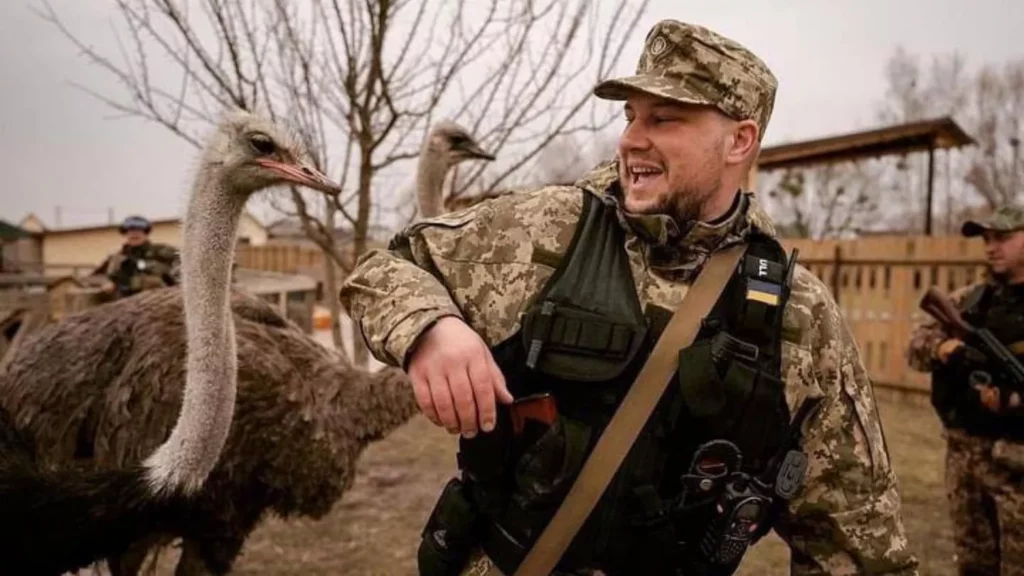
While Ukraine occupies only 6% of Europe’s territory, it is home to 35% of the continent’s biodiversity. Forest fires, loud explosions, and contamination of soil and water lead to the destruction of natural habitats. Many species have migrated, changing both the terrestrial and aquatic ecosystems. Since the beginning of the invasion, there have been more than 1500 reported cases of destruction of the ecosystem, including biosphere reserves and national parks. Indigenous species’ habitats like the Irpin wetlands may be irreversibly damaged due to war.
Air pollution and climate change
The use of explosive weapons, targeting of chemical warehouses and fossil fuel infrastructure, and wildfires are the leading causes of air pollution. Notable examples include the explosion of the 2022 Kharkiv firework warehouse as well as the 2017 Kalynivka ammunition depot explosion. Moreover, the destruction of military equipment, including tanks and armored combat vehicles (ACVs) are the leading causes of emissions of polluting substances into the atmosphere. This carries immediate risks to human health causing respiratory issues such as pneumonia and bronchitis. The war has also increased the release of greenhouse gas (GHG) emissions which directly impacts global warming. In the first seven months of the invasion, at least 100 million tons of CO2 were released in the atmosphere.
Implications for Post-War Restoration
While the Ukrainian government, activists, and civil society are gathering environmental data, recording instances of war damage to nature, the question of how do we keep Russia accountable for its ecocide in Ukraine remains.
Ukraine estimated the measurable, immediate environmental damage from Russia’s war at $46 billion. In addition to direct damages, Russia’s war against Ukraine has diverted Ukraine’s resources away from environmental policies and climate action, which has long-term implications for sustainable development. After almost a decade of work, the International Law Commission, which is the legal body within the UN, adopted the final version of 27 Draft Principles for environmental protection in relation to armed conflict in May 2022. This is a positive and innovative development as the proposed principles blend the laws of armed conflict and best practices, encouraging States and international organizations to ensure that “damage does not remain unrepaired or uncompensated,” among other provisions. The principles will be referred to the UN General Assembly for further consideration.
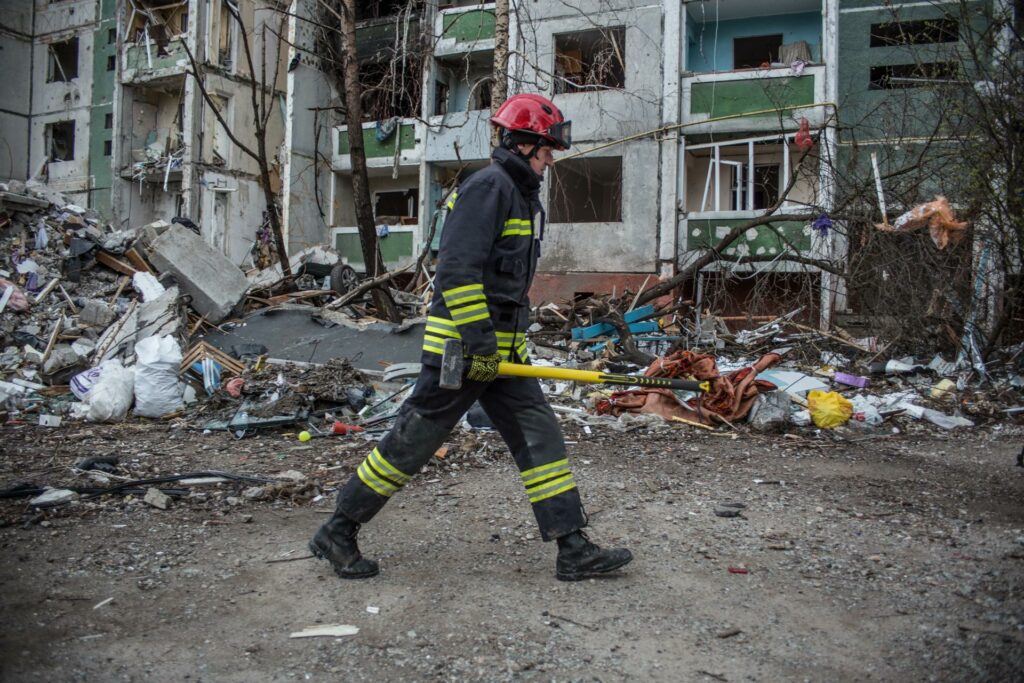
Ukraine is exploring various avenues that will allow it to hold Russia accountable for the environmental damage. The crime of ecocide has been included in the Ukrainian criminal code in 2001. At the international level, the International Criminal Court does not currently recognize ecocide as a crime despite growing pressure to do so; however, international humanitarian law prohibits employing methods of warfare that intend to damage the natural environment. Ukraine has been clear that it will seek reparations from Russia, which could potentially be extracted through seized Russian assets in specific countries. President Zelenskyy keeps ecocide high on the agenda in his 10-point peace plan, which is also one of the country’s preconditions for entering peace negotiations with Russia.
There are few precedents of compensation mechanisms at the international level. The Compensation Commission was established by the UN Security Council in 1991 to require Iraq to pay reparations for damage during its invasion of Kuwait, including environmental damage. With Russia having veto power in the Security Council, this might not be an option. However, the resolution “Furtherance of remedy and reparation for aggression against Ukraine” adopted by the General Assembly in November 2022 recommended developing a register of the damages to the environment at the international level, which could be a step towards accountability.
Conclusion
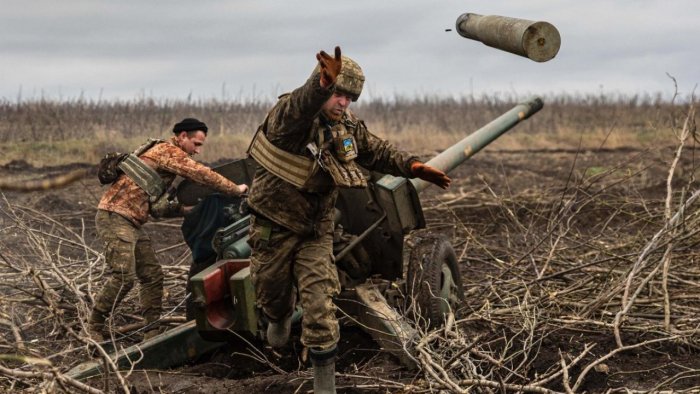
Environmental damage affects the health, food supply, and livelihoods of Ukrainians. The ecological consequences have implications beyond local borders, affecting transboundary air and waters like the Black Sea. Nongovernmental and governmental organizations alike are monitoring environmental damage to estimate the required funds and time to restore the civilian and critical infrastructure, and the ecosystem. Full restoration of the environment will take decades and the long-term effects will likely remain overlooked due to difficulties in measurement and lack of legal mechanisms. Nevertheless, seeking accountability for the immediate environmental damage will be crucial in achieving justice and will create an important precedent for the future.
By Zuzanna Iwanejko, Maryna Maiboroda, and Daryna Lesniak
Sources:
Cottrel et al. (2022). “Explosive Weapons Use and the Environmental Consequences: Mapping Environmental Incidents in Ukraine” The Journal of Conventional Weapons Destruction.
Kroeger, Alix (2023). “How the War in Ukraine is Killing Marine Mammals” BBC https://www.bbc.com/future/article/20221222-how-the-war-in-ukraine-is-killing-marine-mammals
Rawtani et al. (2022). “Environmental damages due to war in Ukraine: A perspective.” Science of Total Environment
“Ukraine Conflict Environmental Briefing: Fossil Fuel Infrastructure” (2023). Conflict and Environment Observatory
“Ukraine Conflict Environmental Briefing: The Coastal and Marine Life” (2023). Conflict and Environment Observatory
“Ukraine Conflict Environmental Briefing: Water” (2023). Conflict and Environment Observatory
